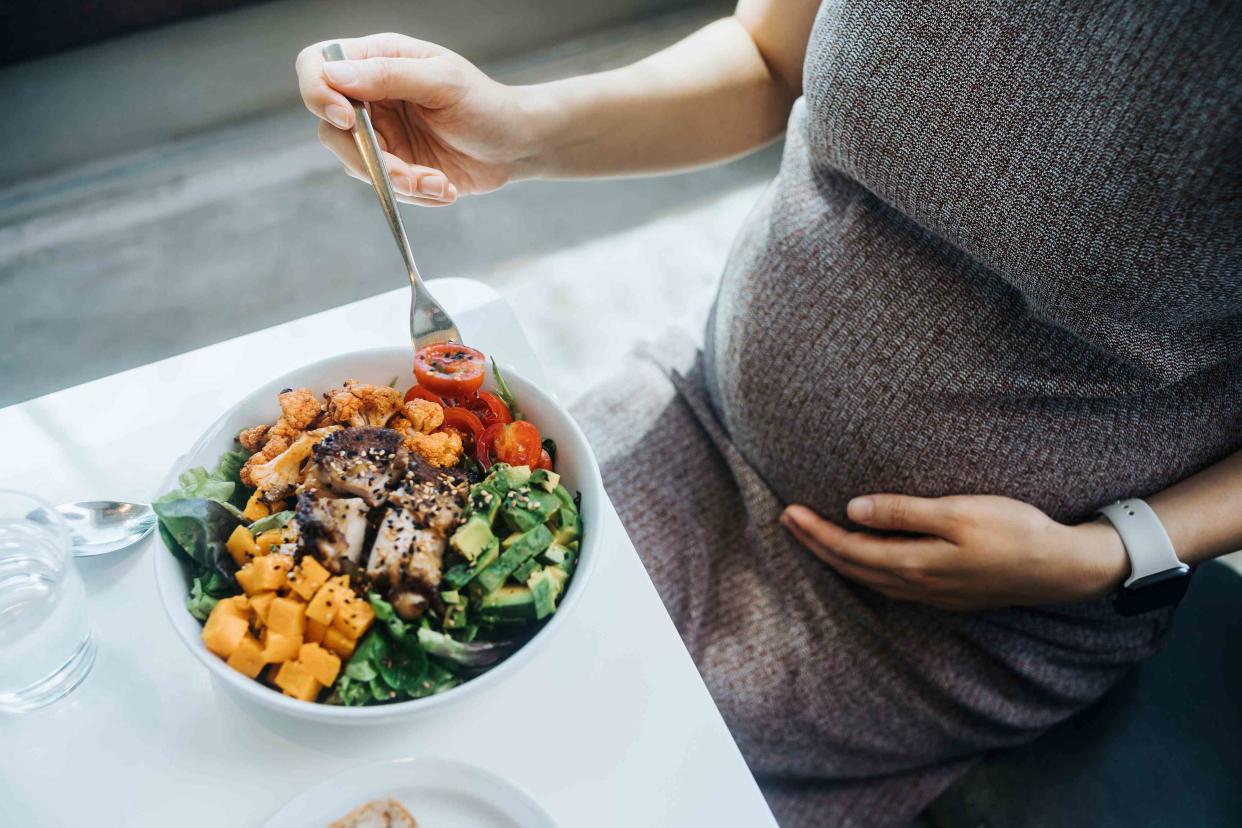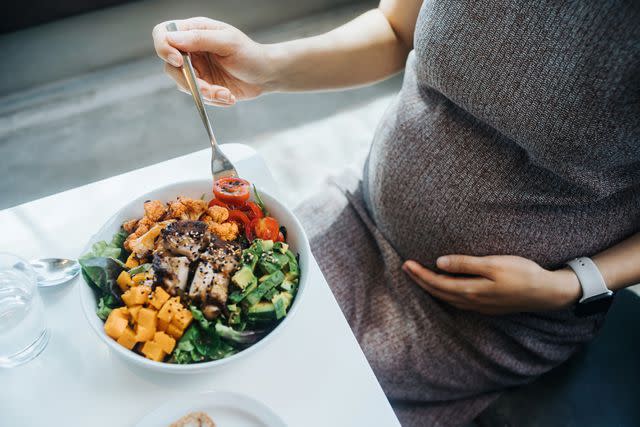How to Manage Anemia During Pregnancy

d3sign / Getty Images
Medically reviewed by Peter Weiss, MD
Iron deficiency anemia (IDA) is the most prevalent nutrient deficiency worldwide, affecting an estimated 30% of the population. One of the most at-risk groups for developing IDA is pregnant women due to their growing blood volume and the increased demand for iron to support fetal growth and development. A combination of dietary changes and iron supplementation is often beneficial to prevent and treat IDA during pregnancy.
This article discusses why anemia occurs in pregnancy, the symptoms to look for, and how to prevent and manage it.

d3sign / Getty Images
Why Does Anemia Develop During Pregnancy?
Iron deficiency anemia is more likely to develop among pregnant women than nonpregnant women. This is mainly because the demand for iron during pregnancy is significantly increased. The iron requirements during pregnancy increase tenfold, from 0.8 milligrams (mg) per day in the first trimester to 7.5 mg per day in the third trimester.
This drastic increase is necessary to support the growth and development of the fetus, as well as the health and function of the placenta. Additionally, more iron is needed to support the increase in the amount of the pregnant person's red blood cells during pregnancy and boost stores in preparation for blood loss during delivery.
Iron deficiency anemia generally results from not meeting this increased demand through dietary and supplemental iron. Other causes can include blood disorders such as sickle-cell anemia, a genetic condition in which an abnormal form of hemoglobin causes red blood cells to become rigid, or thalassemia, a genetic condition in which the body doesn't make enough hemoglobin. Hemoglobin is a protein in red blood cells that carries oxygen throughout the body.
Finally, the risk of developing IDA can increase during pregnancy if the pregnant person also has human immunodeficiency virus (HIV), a parasitic infection, or a deficiency of folate or vitamin B12.
Postpartum Anemia
Iron stores can remain low after giving birth, so talk to a healthcare provider about your need for postpartum iron supplementation. They will consider your iron levels during pregnancy, after delivery, through your diet, and while breastfeeding to determine whether you would benefit from iron supplementation after birth.
Symptoms of Anemia in Pregnancy
Several clinical signs can indicate whether you have iron deficiency anemia during pregnancy. Some of the most common are:
Fatigue
Restless legs syndrome
Irritability
Difficulty concentrating
Weakness
Shortness of breath
Pale skin
Heart palpitations
Pica, a condition of craving and eating nonnutritive (not providing nourishment), nonfood substances over at least one month, may also indicate IDA. Several studies have found that individuals diagnosed with pica also have low iron levels.
Fortunately, screening for iron deficiency anemia is on the radar of most obstetric healthcare practitioners. If you're experiencing any of the symptoms listed, speak with your provider about getting evaluated so that a deficiency can be adequately prevented or corrected.
Treatment: How to Get More Iron During Pregnancy
The best way to treat and prevent iron deficiency anemia during pregnancy is to boost your iron intake directly. This usually includes eating a combination of iron-rich foods and taking iron supplements to help meet the increased needs of pregnancy. A healthcare provider can help you identify whether your iron levels are low and what is the best approach to correct them.
There are two types of iron. These are heme iron, found in animal products, and nonheme iron, found in plant foods.
Examples of dietary iron sources include:
Red meat
Beans
Peas
Lentils
Shellfish
Leafy greens
Poultry
Pumpkin seeds
Dark chocolate
Tofu
Quinoa
Iron-fortified cereals
Heme iron is more readily available than nonheme iron, meaning it is better absorbed by the body. If you don't consume animal products, you can help increase your nonheme iron absorption by pairing iron-rich foods with foods rich in vitamin C. For example, citrus fruits, bell peppers, broccoli, berries, and tomatoes are all good sources of vitamin C.
Even before you conceive, taking a prenatal vitamin with iron is a good idea to help boost iron stores. Regardless, this is an important supplement to take throughout pregnancy. The average prenatal vitamin will provide 100% of the Daily Value for iron, which is 27 mg daily during pregnancy. Your healthcare provider may prescribe a separate iron supplement if your blood iron levels remain low.
Related: Iron Supplements: Side Effects, Uses, and More
Complications of Anemia in Pregnancy
Although anemia is common during pregnancy, that doesn't mean it can be ignored. IDA during pregnancy can have a significant negative impact on both the pregnant person and the fetus.
Untreated anemia during pregnancy can lead to complications such as:
Low infant birth weight
A higher risk for increased blood loss during delivery
Going into preterm labor, defined as delivering between 20 and 37 weeks of pregnancy
Anemia in the baby
Infant developmental delays, including poor memory and abnormal brain function
Impaired fetal growth
Increased risk of infant death before or after birth
A healthcare provider may recommend delayed cord clamping (DCC) for your baby if you are diagnosed with iron deficiency anemia during pregnancy. This means delaying clamping the umbilical cord until between one and three minutes following birth to promote iron-rich blood flow from the placenta to the newborn. DCC is a low- to no-cost and easily implemented practice to reduce the risk of infant anemia.
How to Prevent Anemia in Pregnancy
Untreated anemia can lead to severe consequences for the health of both the pregnant person and the baby. Fortunately, preventing anemia in pregnancy can be done with a few simple changes.
The two main ways to prevent anemia in pregnancy include:
Consuming iron-rich foods
Taking an iron-containing prenatal supplement
Attending your regular pregnancy appointments and communicating any concerns to a healthcare provider is also essential.
Incorporating foods like red meat, poultry, beans, peas, lentils, leafy greens, tofu, and iron-fortified foods, can help ensure that you meet your daily iron needs through diet.
A prenatal iron supplement can help prevent anemia, especially if you start taking it before becoming pregnant. However, if a healthcare provider identifies that you have lower-than-normal iron levels at any point, they will likely prescribe an additional iron supplement.
Summary
Iron deficiency anemia is very common. It is more likely to develop during pregnancy due to the increased need for iron to support fetal growth and development. Untreated anemia during pregnancy can lead to health complications for both the pregnant person and the baby.
Fortunately, iron deficiency anemia can be prevented and treated when properly identified. Incorporate iron-rich foods into your diet pattern and take an iron-containing prenatal supplement. Attend your regular pregnancy appointments and communicate any concerns you have to a healthcare provider so that they can best support your health during pregnancy.

